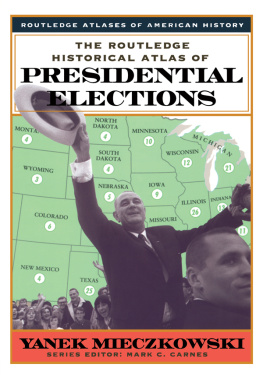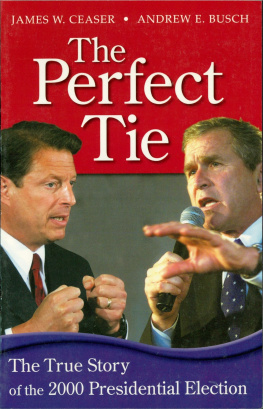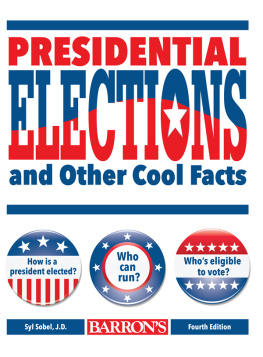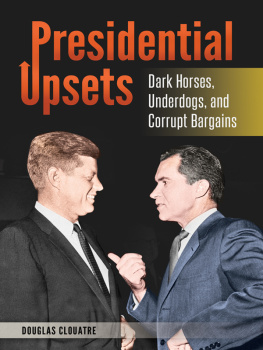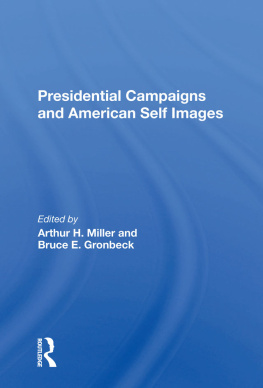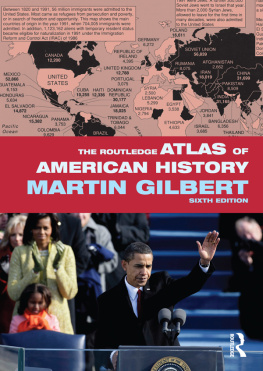THE ROUTLEDGE
HISTORICAL ATLAS
OF
PRESIDENTIAL ELECTIONS
Routledge Atlases of American History
Series Editor: Mark C. Carnes
The Routledge Historical Atlas of the American Railroads
John F. Stover
The Routledge Historical Atlas of the American South
Andrew K. Frank
The Routledge Historical Atlas of Women in America
Sandra Opdycke
The Routledge Atlas of African American History
Jonathan Earle
The Routledge Historical Atlas of Religion in America
Bret E. Carroll
THE ROUTLEDGE
HISTORICAL ATLAS
OF
PRESIDENTIAL ELECTIONS
YANEK MIECZKOWSKI
MARK C. CARNES, SERIES EDITOR

Published in 2001 by
Routledge
711 Third Avenue
New York, NY 10017
Published in Great Britain in 2001 by
Routledge
2 Park Square, Milton Park
Abingdon, Oxon OX14 4RN
Routledge is an imprint of the Taylor & Francis Group, an informa business
Text copyright 2001 by Yanek Mieczkowski
Maps and design 2001 by Arcadia Editions Ltd.
All rights reserved. No part of this book may be reprinted or reproduced or utilized in any form or by any electronic, mechanical, or other means, now known or hereafter invented, including photocopying and recording or in any information storage or retrieval system, without permission in writing from the publishers.
Routledge, Inc. respects international copyrights laws. Any omissions or oversights in the acknowledgments section of this volume are purely unintentional.
Library of Congress Cataloging-in-Publication Data
Mieczkowski, Yanek
The Routledge historical atlas of presidential elections / Yanek Mieczkowski.
p. cm. (Routledge atlases of American history)
Includes bibliographical references and index.
ISBN 0-415-92133-3 (hardback : alk. paper) ISBN 0-415-92139-2 (pbk : alk. paper)
PresidentsUnited StatesElectionHistoryMaps. I. Title. II. Title. III. Series.
G1201.S1 M5 2001
328.9730223dc21
00-30014 00051771
To Bogdan, Seiko,
Van, and Dean
The presidential election of the year 2000 turned on Florida. Just before the polls closed there, the major television networks announced that, based on a sampling of those who had just voted, Democratic candidate A1 Gore had won the state. Several hours later, the networks retracted their prediction. Now Florida was too close to call. By three oclock A.M., after 99 percent of the Florida vote had been counted, the networks announced that Republican George W. Bush had won the state. But as the sun rose over the Everglades and returns trickled in from the remaining precincts, the networks again reversed themselves: Bushs lead in Florida had dwindled to several hundred votes out of six million cast. Florida, the networks sheepishly reported, was again too close to call. And so it remained for weeks while local, state, and federal courts wrangled over who had won the stateand with it, the presidency.
Nationwide, Gore had received 300,000 more votes than Bush had. But the Constitution provided that the president was not to be chosen directly by the nations voters, but by an electoral college. The idea of an electoral college grew out of a heated debate during the Constitutional Convention of 1787. Some delegates had then questioned whether the people of the vast young nation possessed the requisite capacity to choose the chief executive; such unlettered and far-flung peoples would likely be swayed by a few active and designing men. It would be preferable for Congresseither the House of Representatives, the Senate, or bothto select the nations president. But James Madison and Gouverneur Morris countered that if the president were chosen by the legislative branch, he would become subservient to its wishes. The president should serve the people and be held directly accountable to them. Unable to come to agreement, the delegates eventually turned this contentious matter over to a Special Committee on Postponed Matters, which, after much debate, finally proposed a fateful compromise: neither the American people nor any branch of Congress would choose the president. Instead, each state would select, in a manner of its own devising, presidential electors equal in number to the states total congressional delegation (members of the House of Representatives plus two senators); and the electors of all the states would meet together as an electoral college to choose the president.
Whatever the merits of the compromiseJames Madison later conceded that the decision had been partly a product of a degree of the hurrying influence produced by fatigue and impatiencethe electoral college has decisively shaped presidential political campaigns. The election of 2000 was an especially vivid demonstration of this fundamentalsome might say peculiaraspect of American politics. Because politicians were obliged to win states (and thus their electors), presidential candidates have long tailored their speeches and programs to appeal to states whose electoral votes were thought to be decisive. Presidential candidates have fought their battles, inescapably, upon the geographical landscape marked by the boundaries of the states.
In this atlas Yanek Mieczkowski repeatedly illustrates the truth of this assertion. Even a glance at its pages reveals much about our political culture: the continuities of its distinctive regionsNew England, the South, the north central Plains, the Far Westand also the historic shifts that have forced new alignmentsthe breakup of the Federalists, and then of the Whigs; the rise of the Republican Party in the North and Midwest; the way in which the FDR, LBJ, and Reagan landslides obliterated the old political boundaries; the southern strategy of Republicans Richard Nixon and, later, Ronald Reagan; and so on.
This atlass clarity of purpose is reinforced by Mieczkowskis clean, concise narrative; together, the maps and the text encapsulate millions of words of contentious speeches, party platforms, and political conniving. Casual readers and candidates for a doctoral degree in history alike will find this an indispensable household reference; it may well constitute the best brief guide to American history yet published. It is a worthy and indispensable addition to the Routledge Atlases of American History series.
Mark C. Carnes
Barnard College, Columbia University
Series Editor
The presidency is the highest elective office in the United States and, along with the vice presidency, the only one where the winner is not determined through direct popular vote. The Founding Fathers designed the awkward electoral college system to avoid direct popular elections, because they lacked faith in the common peoples ability to choose the best candidate. Few aspects of the Constitution have been so roundly condemned as the electoral college, because it can deny the will of the peopleand has, in four elections.
In the early years of the republic, each state selected its electors by a method of its own choosing (such as popular vote or appointment by state legislature), and the number of electors equaled the sum of a states U.S. representatives and senators, ensuring at least three electors for each state. Each elector was to cast two votes for president; the candidate with the most electoral votes would win, while the runner-up would be vice president. There was no campaign ticket with a pair of running-mates; since the Founding Fathers envisioned a political system without parties, the presidential and vice presidential candidates would have no partisan affiliations and would not need to campaign as a team against another partys candidates. Yet political parties immediately emerged, and the system they had created suffered growing pains and awkward adjustments.
Next page
